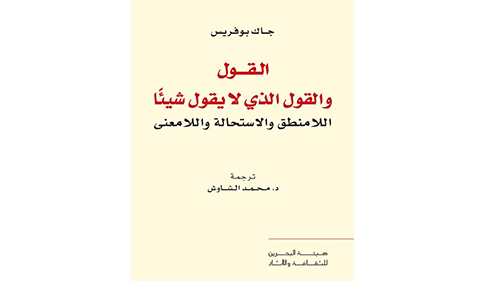Contact Center
.
24 September 2019
Latest Transfer of Knowledge Project Publications, Jacques Bouveresse, « Dire et ne rien dire : l'illogisme, l'impossibilité et le non-sens »


Bouveresse and the French Tradition’ provides a useful account of ‘bringing Wittgenstein to Paris’ through his Le Mythe de l’intériorité: Expérience, signification et langage privé chez Wittgenstein in 1976. While he had contributed earlier articles to Cahiers pour l’analyse and Critique it was his book that really sparked ‘a growing number of companion studies on different aspects of Wittgenstein’s thought: anthropology, iconography, religion, aesthetics, architecture, music, Freud, modernity and the idea of progress’ (n.p.). Against Descartes’ ideal of the pure ego, Collins (2017) pictures Bouveresse as making an argument close to the point of view of Ordinary Language Philosophy: “Language was indissociable from ‘thinking’, ‘feeling’, ‘sensing’, and philosophers could not afford to ignore it. Humans learn to think in communication with other subjects; language, the intersubjective medium through which they do so, is key to how they think about themselves and the world. Through language, in other words, thinking is necessarily public (n.p.).
In the Tractatus Logico Philosophicus, Wittgenstein argued for a representational theory of language. He described this as a ‘picture theory’ of language: reality (‘the world’) is a vast collection of facts that we can picture in language, assuming that our language has an adequate logical form. ‘The world is the totality of facts, not of things’, Wittgenstein claimed, and these facts are structured in a logical way. The goal of philosophy, for early Wittgenstein, was to pare language back to its logical form, the better to picture the logical form of the world.One of Frege’s basic philosophical convictions has been that “a large part of the philosopher’s work consists—or at least should consist—in a fight against language.
What defines meaning and nonsense, what can be said and what cannot be said? As an answer, Jacques Bouveresse proposes a reflection on the linguistic meaning, from the main theories on the limit of the senses, of contemporary philosophers like Frege, Husserl, and Wittgenstein.
The book titled « Dire et ne rien dire : l'illogisme, l'impossibilité et le non-sens » is the 33rd in a series of publications by Bahrain Culture Authority.
Worth to mention that “Becoming Virtual: Reality in the Digital Age” is the 16th publication presented by Knowledge Transfer Project. The first book was “ Think: A Compelling Introduction to Philosophy by Simon Blackburn”, “Did Greeks Believe in their Myths?” by the French intellectual Paul Veyne, and Maurice Olender, The Languages of Paradise: Race, Religion, and Philology in the Nineteenth Century”, and “ Psychoanalysis as a Science, Therapy and Cause” by the Egyptian psychoanalyst living in France, Mustapha Safwan. and “Non-Places: An Introduction to Supermodernity” by Marc Augé and Three ABCs by Clarisse Herrenschmidt, “The End of the World as We Know it” by the American Sociologist Immanuel Wallerstein, “The Story of Art” by Ernest Gombrich, “A Social History of the Media: From Gutenberg to the Internet” by n Asa Briggs and Peter Burke, “Einstein, Picasso: Space, Time, and the Beauty That Causes Havoc” by Arthur Miller, “The Content of the Form: Narrative Discourse and Historical Representation” by Hayden White, “ Ethnology Approach” by Pacal Debie, and “Non-Places: Introduction to an Anthropology of Supermodernity” by Marc Augé, Qu'est-ce que le virtuel ? by Pierre Levy, and “ Should We Think of the World in Another Way” by Chritian Gratello, “The Argumentative Indian: Writings on Indian History, Culture and Identity Paperback”, “Sociology of Religion” by Amartya Sen, Danièle. Hervieu-Léger, Jean-Paul Willaime “Sociology of Religion”, Irwin Dianatelle and Michael Louis, Discourse Analysis as Theory and Method”Marianne W Jorgensen “,
“ History at the Limit of World History” by Ranajit Guha, “ The World of Thought in China Today” by Lan Chung”, “How to Do Things with Words” by John L. Austin.







